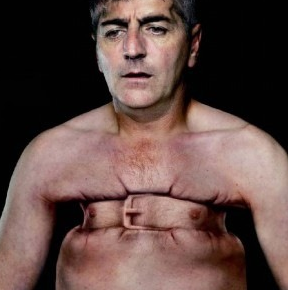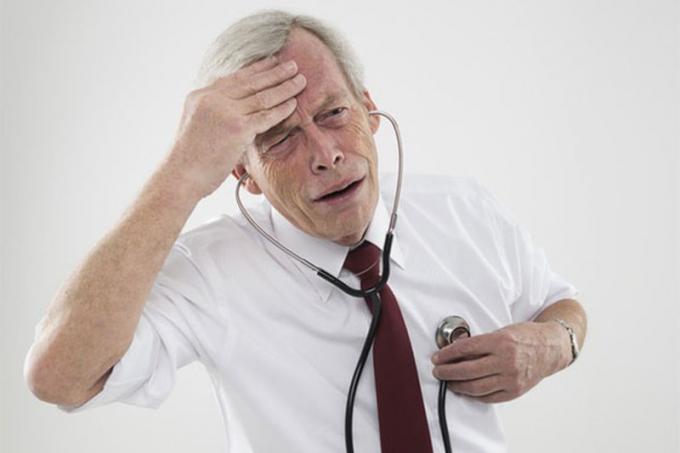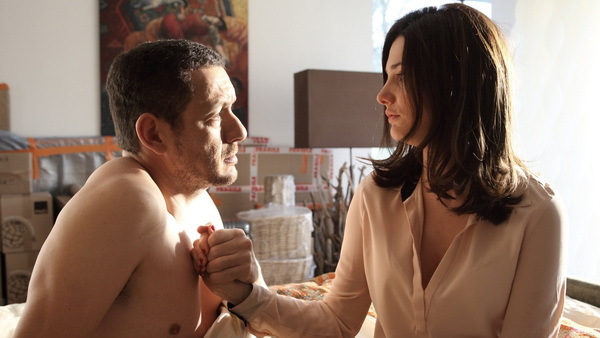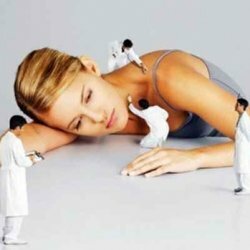Hypochondria: Symptoms and Treatment

Any of us has a propensity to experience for our own health.But, sometimes a person develops and grows internal anxiety, there is excessive fear, incomprehensible painful sensations and completely unreasonable fear for his life.In this case, they talk about the development of hypochondria - one of the varieties of mental pathology.
At present, the frequency of hypochondriac syndrome is quite high.
Contents: Symptoms of hypochondria Causes of hypochondriac syndrome How to get rid of hypochondria Preventive measures Tips for surrounding patients with hypochondriaSymptoms of hypochondria
Note: hypochondriacal experiences are not a separate disease( as most psychiatrists believe), but they accompany a variety of neuro-Mental illnesses, as well as the pathology of other organs and systems.
Classifications of this ailment are very diverse.Terms and definitions are specific and difficult to understand.Our task is to try and understand simply what kind of state it is, what the patient feels, and how people and treating doctors look at him.
True hypochondria can occur in the form:
- sensory responses.In this case, the patient develops painful sensations that, in his mind, are hypertrophied( exaggerated) into voluminous complaints that clearly do not correspond to the real severity of the existing changes in health;
- ideogenic reactions.This variant forms in the patient false ideas about the existing painful sensations.Sometimes anxious notions and fears are so strong that due to the peculiarities of the nervous system, a person who has become ill may actually have internal organ changes.Thus, the hypochondriac can cause constipation, diarrhea, irregularities in the heart, coughing, although there are no objective reasons for them during the examination.

There are three main components in the structure of the hypochondriacal disorder:
- a patient's pain;
- disorders in the emotional sphere;
- Specific Thinking Disorder.
In the case of sensory reactions , the source of the painful sensations arises from the usual physiological acts: eating, sleeping, loading, communicating with people.For example, during a meal there is a slight difficulty in the passage of hard food through the esophagus.A healthy person does not pay any attention at this moment.A hypochondriac against this background will develop a whole chain of reflections, aggravating sensations to the pathological level.The leading meaning in this case belongs to self-suggestion.The patient feels that the food is stuck in the esophagus, caused spasms and coughing, speech disturbance and dyspnea.The focus of consciousness on sensations gradually leads to the formation and strengthening of hypochondriacal complaints.
The hypochondriac develops anxiety( anxiety) and suspiciousness.Consciousness is obsessed with problems, all conversations with others are reduced to one's health and complaints.There is an excessive concern for one's own health.By his behavior the patient begins to irritate loved ones.
 Over time, the individual suffering from hypochondria develops individual multiple complaints, with specific sensations and manifestations.In medicine they are called sensipathies : lump in the throat, inability to breathe, pain in the heart, intestines, limbs.Patients are very colorful and picturesque describe their complaints.
Over time, the individual suffering from hypochondria develops individual multiple complaints, with specific sensations and manifestations.In medicine they are called sensipathies : lump in the throat, inability to breathe, pain in the heart, intestines, limbs.Patients are very colorful and picturesque describe their complaints.
In some cases, hypochondriacal complexes can be transferred to others.
Often in practice, the following occurs:
- parent hypochondria - excessive and intrusive care for the health of their children;
- child hypochondria is a similar manifestation, but already concerning the painful experience of children about their parents.
Those suffering from these kinds of hypochondriac syndrome in their super-care are in a constant depressed mood, experiencing fears and anxiety.Hypochondriacs display obsessive and even overvalued ideas.
Note: patients often believe that the surrounding people, and especially the medical staff, do not see their suffering because of their incompetence and does not want to help.
Depending on the predominant features of the behavior of patients, hypochondria are distinguished:
- of an alarming type - the patient experiences painful experiences about health problems( all treatment seems to him incomplete, insufficient, incorrect);
- depressive type - the suffering person falls into the oppressed state of the psyche( develops hopelessness, there are thoughts about the futility of treatment);
- phobic type - in this case the fears of death, complications, development of other diseases, especially deadly ones( for example, cancer, tuberculosis) come to the forefront.
In communicating with a patient, two predominant symptom complexes can be distinguished:
- asthenic - in the behavior lines, complaints of fictitious superweakness of the state predominate;
- obsessive - in this case, persistent and intrusive complaints and painful feelings dominate.
 Hypochondriacal manifestations depend on the patient's neurosis.In hysterical forms, complaints are demonstrative, expressive.
Hypochondriacal manifestations depend on the patient's neurosis.In hysterical forms, complaints are demonstrative, expressive.
A neurosis with obsessive ideas "fixes" the patient on a painful condition.
A special form of manifestation of hypochondria is the sensitivities .This pathological sensations, manifested by very unusual complaints - "the head is hot as an oven," "itching inside the skull," "pendulum oscillation of the brain."Senestropathy can be both local and generalized( "general") - "current flow throughout the body," "burning the skin of the whole body."
Severopathy can occur against the background of existing brain diseases( encephalitis, meningitis, arachnoiditis).
In the absence of treatment, often develops the hypochondriacal personality shift .All complaints and symptoms are exacerbated.The patient subordinates itself to a certain mode of life, in which the desocialized features are becoming stronger.A person "rushes" between doctors of different specialties, requires more attention, diagnostic procedures and treatment.Strives to get into more prestigious medical institutions.Patients can insist on carrying out completely unnecessary surgical operations.
Some hypochondriacs may have severe attacks of fear on the background of constant complaints.
Note: , some psychiatric schools have identified hypochondria as a separate disease, relying on the fact that the clinical manifestations of this pathology come to the fore in relation to the underlying disease.
Hypochondriacal manifestations can occur as a separate symptom complex in severe mental illness( schizophrenia, manic-depressive psychosis).Patients complain with this form, which are painted in fantastic tones.For example, a patient assures doctors that his heart is not working, or the brain has flowed into the stomach.
Causes of the hypochondriacal syndrome
 Hypochondria in most cases accompanies the already existing changes in the psyche against the background of the underlying disease.Most often, we are talking about neuroses .These are specific forms of mental illness, the so-called "small" psychiatry.The main difference between "borderline" psychiatry and the big one is that those suffering from neuroses are very critical of themselves and of the changes that they have.
Hypochondria in most cases accompanies the already existing changes in the psyche against the background of the underlying disease.Most often, we are talking about neuroses .These are specific forms of mental illness, the so-called "small" psychiatry.The main difference between "borderline" psychiatry and the big one is that those suffering from neuroses are very critical of themselves and of the changes that they have.
Important: understanding the nature of the disease is the main factor for proper treatment.The patient begins to actively participate in the therapy process, helping the doctor.
Hypochondriacal syndrome may accompany with organic pathology of - brain pathology( inflammatory processes, trauma, neoplasms).Often, hypochondria is a true companion of senile diseases that occur with developing dementia( dementia).
plays a role in the genetic predisposition of .Hypochondriacal experiences are also found in children.
Family troubles, problems at work, in educational institutions, fears of anxious personalities can serve as a stimulus for the development of painful experiences and experiences.
How to get rid of hypochondria
When starting to develop therapeutic tactics for patients with hypochondriac syndrome, it is necessary to take into account the main cause of the developed disease.
If the patient is adequate, preference is given to psychotherapeutic methods - individual, rational and group psychotherapy, hypnotic effects, social therapy.
If necessary, prescribe medication correction with the use of tranquilizers, antidepressants.
Widely used in the treatment of hypochondria, reflexotherapy, estetotherapy.
Preventive measures
As a warning for the development of diseases, hypochondriasis should undergo periodic preventive courses of treatment, visit a psychologist, and engage in auto-training methods.Sports loads, travel, communication with people, maintenance and care of animals are very useful.
Tips for surrounding patients with hypochondria

People who have to deal closely with hypochondriacs at home or at work should understand that a patient suffering from this pathological condition is not a pretender or a deceiver.He really suffers, feels pain, fears.To it it is necessary to show sensitivity and ability to be very patient.
Reaction of the patient to a misunderstanding of his condition( often severe) can become resentment, rejection, dislike.Surprisingly, sympathy in this situation has a positive effect on the course of the disease.Hypochondriac does not get rid of his sufferings, but begins very patiently to bear them and fight them.
Psychiatrists use this phenomenon to achieve a serious relationship with the patient.Over time, it is possible to understand what exactly lies at the base of a specific case of hypochondria.The patient, gradually moving away from the discussion of his painful sensations, reveals the original cause of the indisposition.It can be feelings of emptiness, boredom, fear of the future, conflicts, lack of self-realization, children's complexes.Often the factors that trigger the onset of the disease are intertwined.Competent ability to defuse these experiences is the main guarantee of "dissolution" of hypochondria.
How to get rid of hypochondria and how to behave with a hypochondriac?Answers to these questions you will get by watching the video review:
Lotin Alexander, medical reviewer


